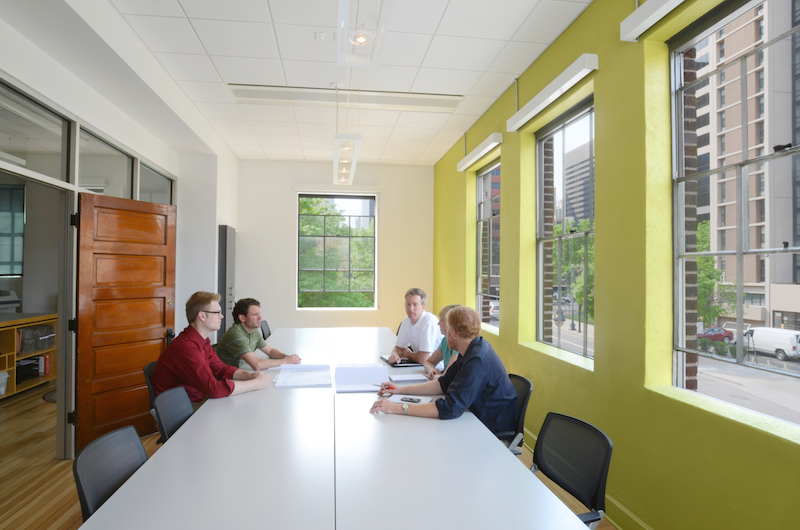The architectural firm Hord Caplan Macht (HCM) recently completed the documentation to verify that its Denver office can meet the standards necessary to be certified under Fitwel, a certification program to support healthier workplaces created by the Centers for Disease Control and Prevention. The Center for Active Design, Fitwel's oerator and third-party certifier, launched in May 2016 and began rolling out to developers and the AEC community last fall.
Working with experts in public health and design, CDC spent five years developing and testing its Fitwel scorecard. The General Services Administration piloted the program in 89 of its buildings.
HCM, which has also provided verification documents for its offices in Alexandria, Va., and Baltimore, is one of five Fitwel Champions that have committed to certifying more than 50 buildings in aggregate. The other Champions include the CDC, which is also Fitwel’s research and evaluation lead; EYP, Integral Group, and Menkes Development.
Perkins+Will was the first company to adopt Fitwel’s standards for all 11 of the firm’s North American offices, which P+W expects will be certified by 2018.
HCM has been in its 13,000-sf Denver office, a former fire station built in the 1920s, since 2010. The office currently has 72 employees. Ara Massey, that office’s Sustainability Design Manager, tells BD+C that the firm measured its three offices against 63 Fitwel strategies in seven health impact categories to establish health and wellness baselines from which it could work toward certification. The evaluation and documentation took about 40 man-hours, she estimates.
The Center for Active Design promotes Fitwel as more “business friendly” than other certification programs. And Massey confirmed that Fitwel gives companies the flexibility to prioritize which standards to align its operations with “without a lot of cost.”
HCM has already successfully integrated many health-promoting features within its offices, including providing staff with fresh fruit and vegetables and locating in areas with high WalkScores.

Hord Caplan Macht's Denver office includes meeting spaces with lots of daylight. Image: Courtesy HCM
However, one thing that surprised Massey was the emphasis that Fitwel’s scorecard places on “lactation rooms” for new Moms returning to the workforce after giving birth. “That was a real eye opener for us,” says Massey.
The next step toward Fitwel certification is the review process, and Massey expects a lot of give and take between her firm and the Center for Active Design to determine how to meet the criteria levels that HCM is willing to adopt.
Now bitten by the wellness bug, HCM also plans to incorporate Fitwel’s wellness standards into its designs for other clients’ projects “as much as possible,” says Massey. “Particularly active design.”
Arup, Structure Tone embrace wellness
While it’s still too early to say definitively, it appears that the wellness movement is slowly catching on with developers and AEC firms. For example, in late December, Arup opened a 16,333-sf office at 60 State Street in Boston, designed by Dyer Brown Architects, which is targeting the Silver level of the International WELL Building Institute’s WELL Building Standard, as well as the Platinum level of LEED v.4.
Structure Tone’s 82,000-sf corporate headquarters in New York City recently became the first project in that metro to receive Well Building Standard certification. It earned a Silver-level designation by installing more efficient mechanicals and lighting that maintains harmony with employees’ circadian rhythms. The office also offers point-of-access water filters, access to healthy foods, and discounts on bike-share and fitness center memberships.
Last year, Structure Tone formed a partnership with Delos, the real estate and tech firm that established the WELL Building Standard, in which Structure Tone agreed to accredit 150 employees through the WELL Accredited Professional program.
Related Stories
| Nov 18, 2011
New green construction code may help push LEED standards higher
The International Green Construction Code (IgCC) is expected to set a floor for building standards and may create the opportunity for LEED certifications to push toward higher ceilings.
| Nov 18, 2011
New OSHA fall safety rule could save contractors money on insurance premiums
The new Occupational Safety and Health Administration rule requiring employers operating in the residential construction industry to use the same methods of fall protection that historically have been used in the commercial construction industry could save them money.
| Nov 18, 2011
Some believe new Austin building code will help mom and pop shops
Austin, Texas has proposed building codes that require wider sidewalks and call for buildings to be closer to sidewalks along a 3.5-mile stretch of highway.
| Nov 10, 2011
WaterSense standard for weather-based irrigation controllers unveiled
The U.S. Environmental Protection Agency’s (EPA) WaterSense program has released a final specification for weather-based irrigation controllers—the first outdoor product category eligible to earn the WaterSense label.
| Oct 28, 2011
New ISO standard for escalator safety
A new ISO standard specifies safety requirements for escalators and moving walks.
| Oct 20, 2011
LEED 2012 to require real-time energy, water use reporting
The LEED 2012 rating system, set to launch in November 2012, will contain features to make sure buildings function as intended, and improve over time.
| Oct 13, 2011
New Building Materials Label Focuses On Sustainability
Architectural products company Construction Specialities and design firm Perkins + Will have created a label for building materials to shed light on product content.
| Oct 6, 2011
Constructed properly, green roofs hold up well in a hurricane
The heavy rains and high winds of Hurricane Irene didn’t cause any problems for a Con Edison green roof in New York City. The roof contains sedum, a plant that adapts well to drought and handles periods of heavy rain well.
| Oct 6, 2011
RoofPoint: A new green standard for roofs
Structured much like other rating systems, RoofPoint, establishes green standards specifically for roofs.











